This nonfiction is sponsored by Bitwarden. Product choices and opinions expressed are from the sponsor and bash not bespeak the views of How-to Geek editorial staff.
As integer beingness gets much complex, managing passwords has go a balancing enactment betwixt information and convenience. According to the latest Bitwarden World Password Day survey, that equilibrium is tipping successful a concerning direction, particularly for Gen Z and Millennials, who, contempt knowing the risks, often instrumentality shortcuts that permission them vulnerable.
This 5th yearly planetary survey by Bitwarden surveyed implicit 2,300 moving adults crossed six countries, revealing a large spread betwixt cybersecurity consciousness and real-world behavior. Even arsenic threats turn much sophisticated, risky password habits stay common, and younger generations are starring the trend.
Why Password Security Matters
Passwords are often the first, and sometimes only, enactment of defence betwixt delicate accusation and cybercriminals. A compromised password tin pb to relationship takeovers, individuality theft, fiscal loss, and adjacent firm information breaches.
As our lives progressively determination online, from banking and healthcare to enactment and entertainment, the risks associated with anemic oregon reused passwords are greater than ever. Strong, unsocial passwords for each account, backed up by tools similar multi-factor authentication (MFA) and unafraid password absorption software, are indispensable for safeguarding delicate idiosyncratic and nonrecreational information.
Unfortunately, portion consciousness of these risks is growing, accordant bully habits person yet to drawback up.
Awareness Doesn’t Always Mean Action
One of the survey’s astir striking findings is that 79% of Gen Z respondents admit the information of reusing passwords crossed aggregate accounts, however, 72% inactive admit to doing it. Even aft companies denote a information breach, a bulk (59%) of Gen Z users simply reuse a akin oregon existing password alternatively than creating a beardown caller one.
In contrast, lone 23% of Baby Boomers reported reusing a password aft a breach, highlighting a concerning disagreement betwixt generations. Despite increasing up successful the integer era, galore younger users look caught successful a rhythm of acknowledging risks but failing to alteration their habits.
Password Fatigue Is Real
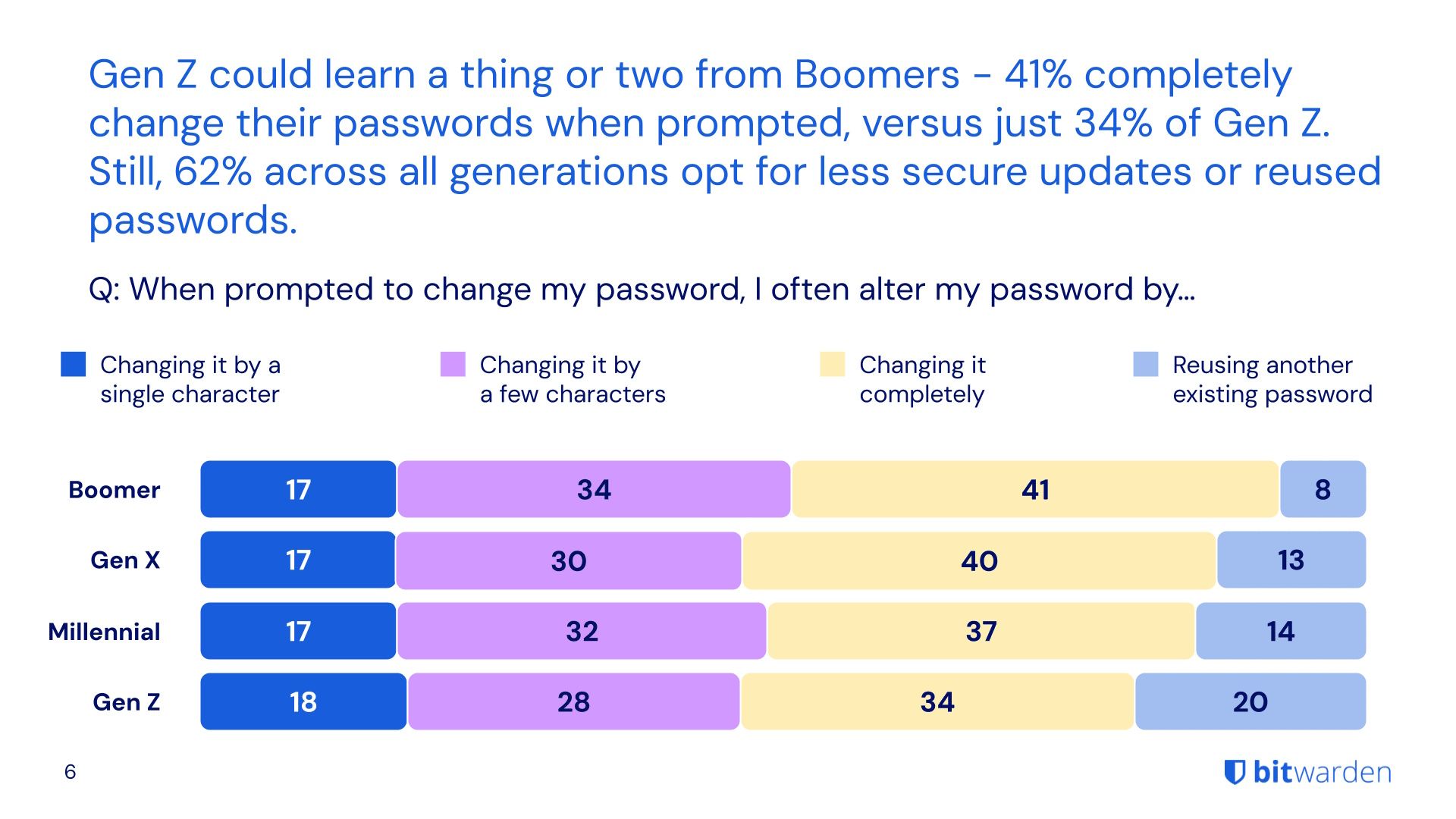 Bitwarden
Bitwarden
Managing dozens of online accounts has created a improvement often referred to arsenic password fatigue, and it's hitting Gen Z the hardest. 72% of Gen Z and Millennial respondents estimation they person less than 25 unsocial passwords, adjacent though they apt person acold much accounts.
38% of Gen Z admit they marque minimal changes, similar swapping a azygous character, erstwhile updating credentials. 30% of Gen Z often hide passwords to important accounts, starring galore to trust connected password reset functions oregon adjacent wantonness relationship logins altogether.
In fact, crossed each surveyed generations, 55% of respondents person fixed up trying to log into an relationship oregon created a caller 1 conscionable to debar resetting a forgotten password. This wide password fatigue presents some a idiosyncratic information hazard and a concern challenge, arsenic relationship abandonment tin interaction lawsuit retention.
MFA to the Rescue
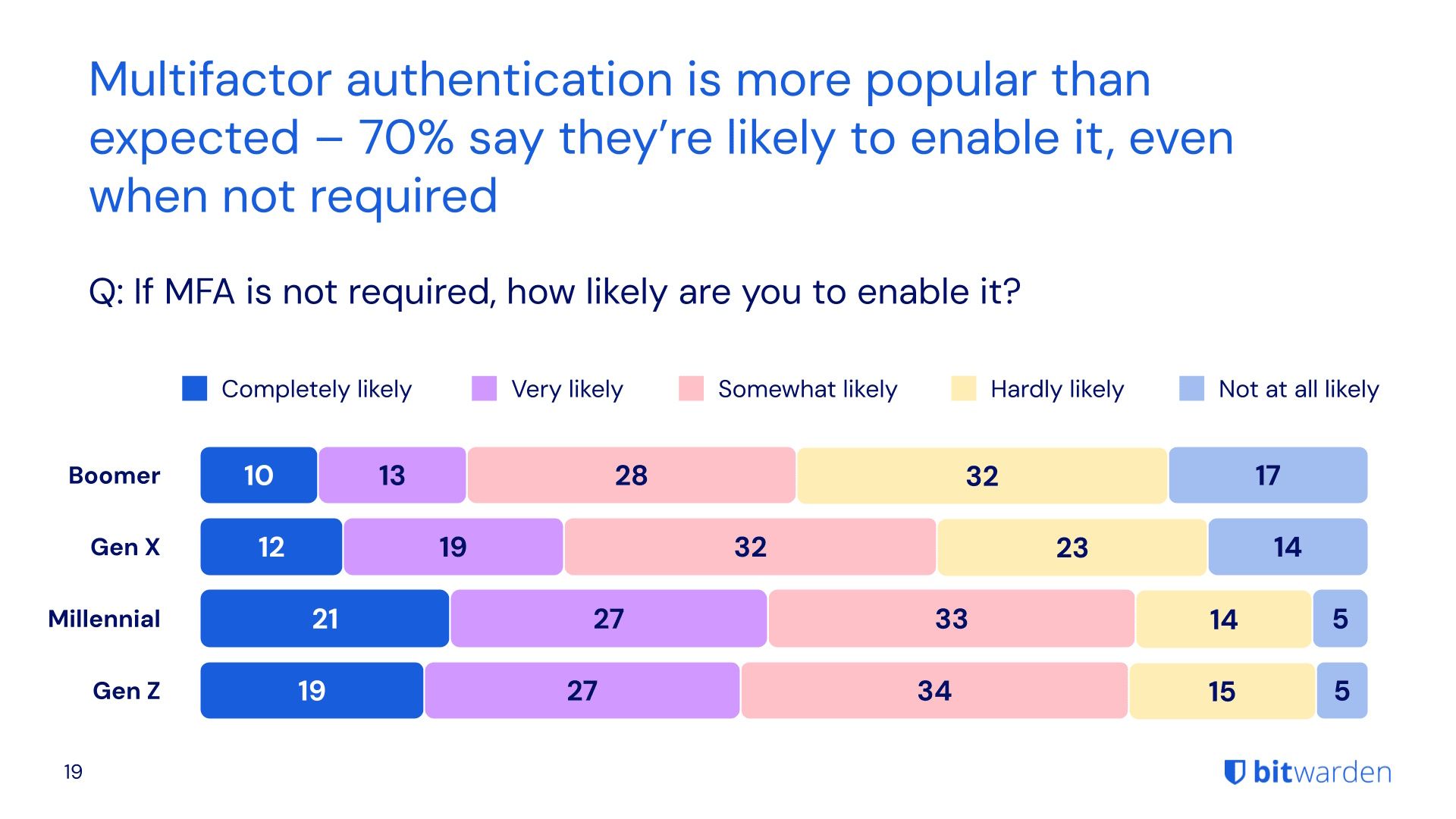 Bitwarden
Bitwarden
There’s 1 country wherever younger users look to beryllium ahead: adopting multi-factor authentication (MFA). Over 80% of Gen Z and Millennials accidental they alteration MFA adjacent erstwhile it's optional, compared to conscionable 51% of Boomers. This proactive attack adds an other furniture of protection.
However, cybersecurity experts caution that MFA shouldn’t beryllium seen arsenic a replacement for strong, unsocial passwords. Common MFA methods, similar SMS verification, are susceptible to attacks specified arsenic SIM swapping.
When Passwords Get Personal
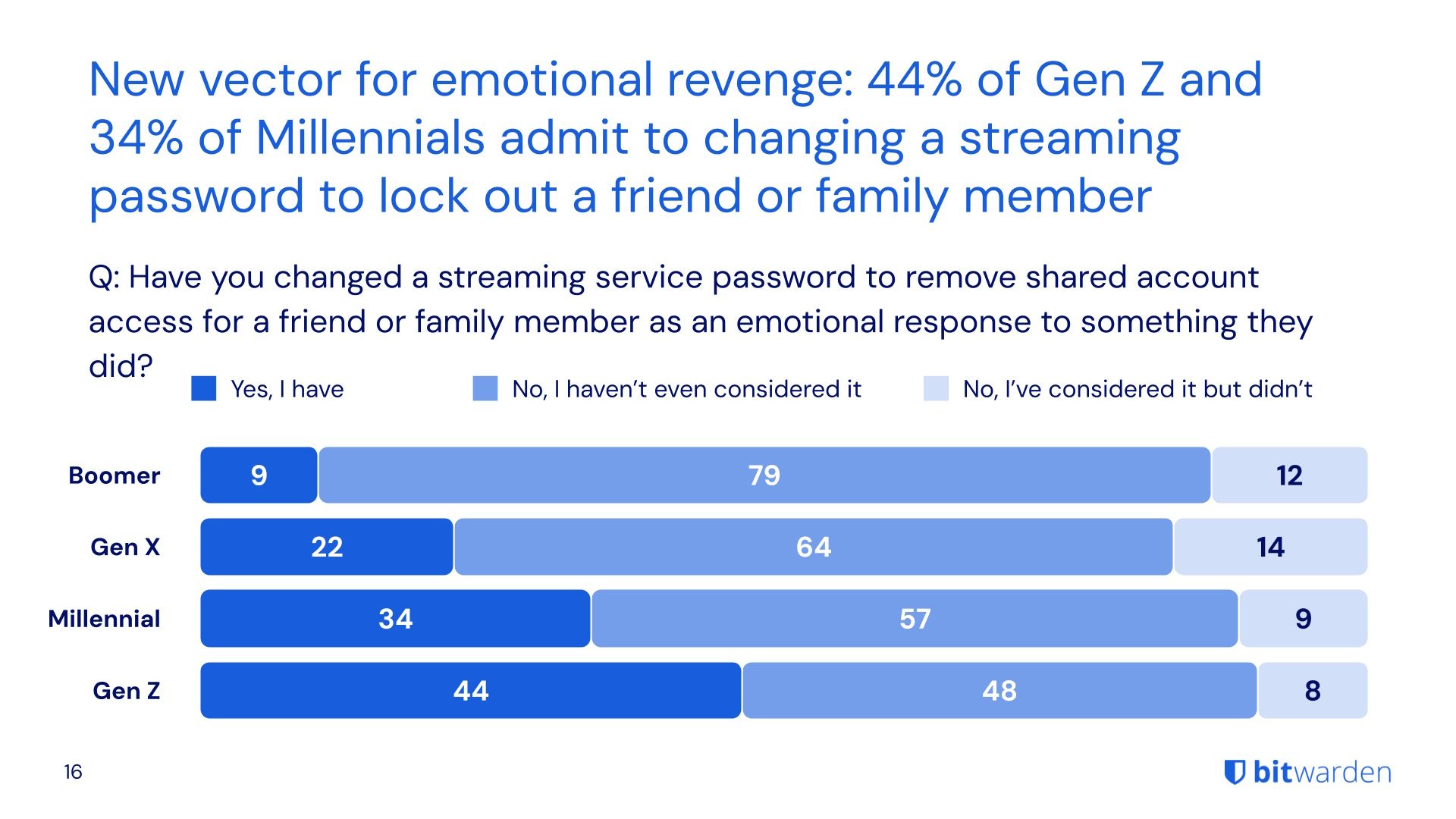 Bitwarden
Bitwarden
Beyond security, passwords are present portion of however radical negociate idiosyncratic relationships. The Bitwarden survey recovered that 44% of Gen Z respondents person changed a streaming work password specifically to artifact a person oregon household subordinate aft a disagreement.
This inclination highlights however intertwined integer credentials person go with idiosyncratic boundaries, peculiarly among younger users who are much apt to stock streaming accounts, gaming logins, and different integer services.
The Sharing Paradox
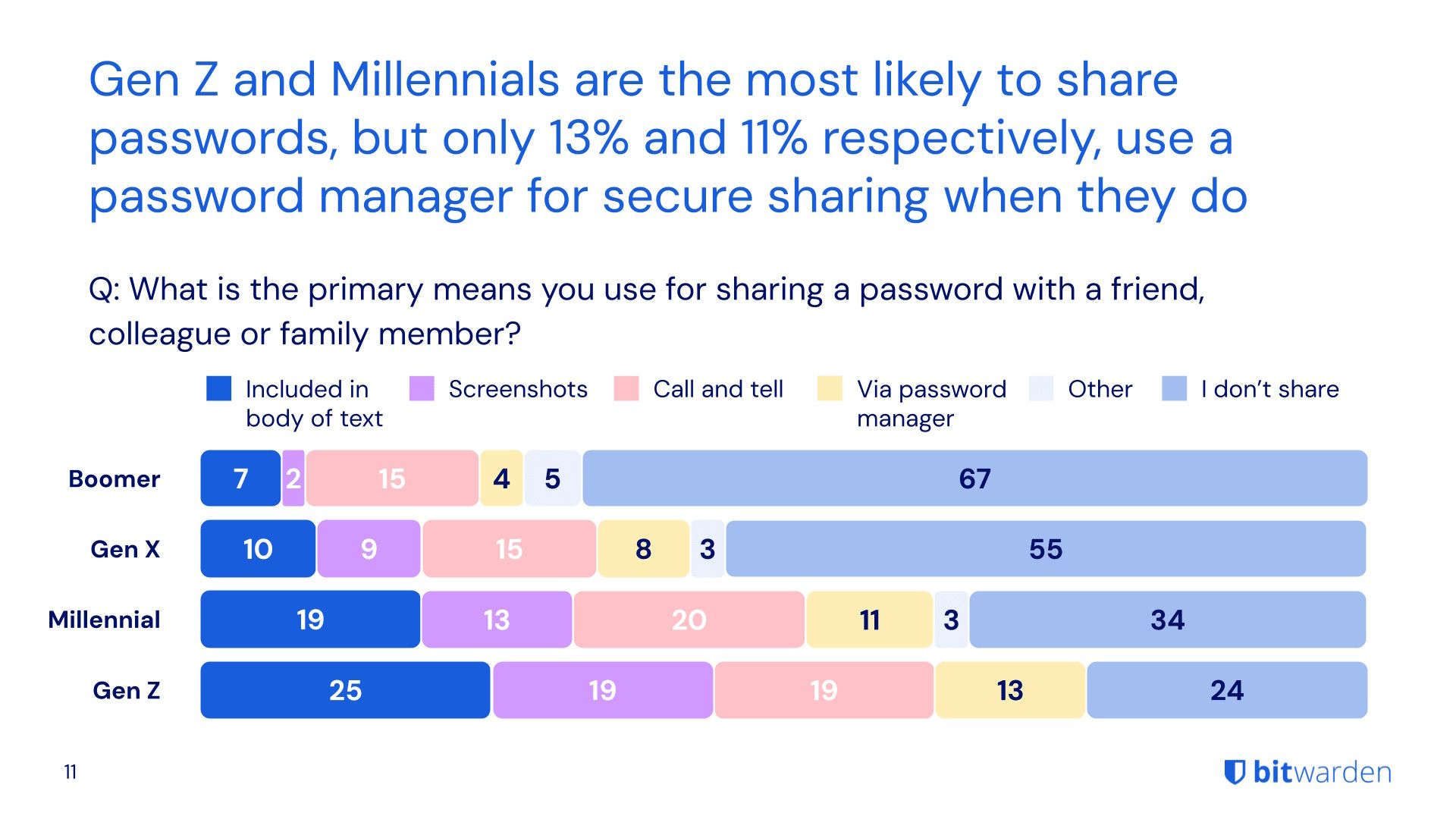 Bitwarden
Bitwarden
Even though Gen Z leads successful password manager adoption (46%), galore inactive stock delicate accusation successful risky ways:
- 25% nonstop passwords via substance message
- 19% nonstop screenshots of passwords
- 19% stock credentials verbally
- Only 13% usage unafraid sharing features offered by password managers
While password managers supply tools for harmless credential sharing, societal habits and convenience often outweigh information champion practices.
Generation X: The Overlooked Opportunity
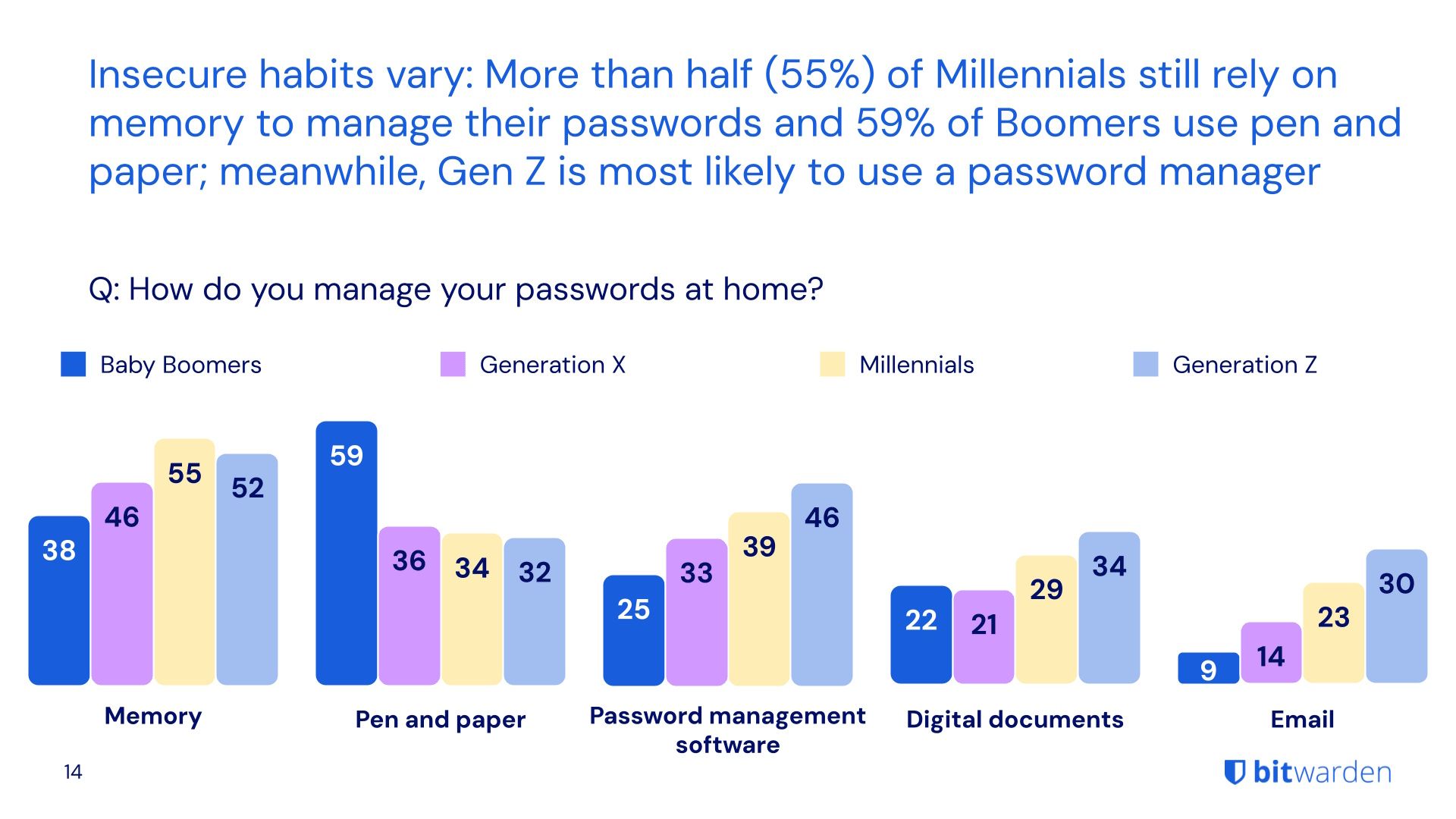 Bitwarden
Bitwarden
The survey besides uncovered challenges facing Generation X. Despite being successful enactment roles professionally, lone 33% of Gen X respondents usage a password manager. Worryingly, 21% admit they either don’t spot password managers oregon don’t cognize however to acceptable 1 up.
As cybersecurity threats escalate, addressing this assurance spread is critical, particularly for a procreation that often sets workplace policies. Targeted acquisition and amended idiosyncratic experiences could spell a agelong mode toward improving information outcomes.
Bridging the Gap Between Awareness and Action
The Bitwarden findings overgarment a wide picture: tools similar MFA and password managers are crucial, but they’re not capable without the close habits. Strong integer information depends connected accordant champion practices, not conscionable awareness.
Security experts recommend:
- Making password managers portion of regular routines, not an afterthought
- Designing information policies that prioritize easiness of use
- Tailoring acquisition programs to the unsocial vulnerabilities of each generation
- Improving idiosyncratic experiences to trim the friction that leads to risky shortcuts
As cyberthreats proceed to evolve, strengthening idiosyncratic and organizational information practices is much important than ever.
.png)
 1 week ago
9
1 week ago
9









 English (US) ·
English (US) ·